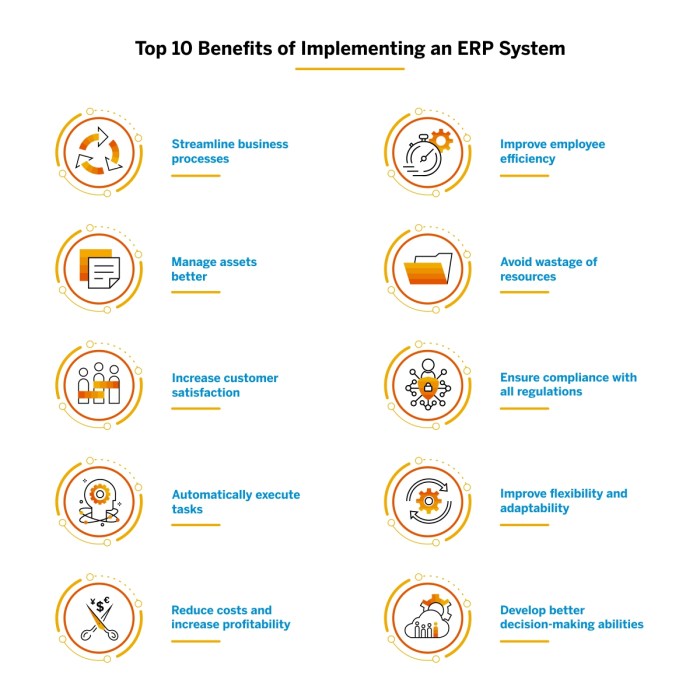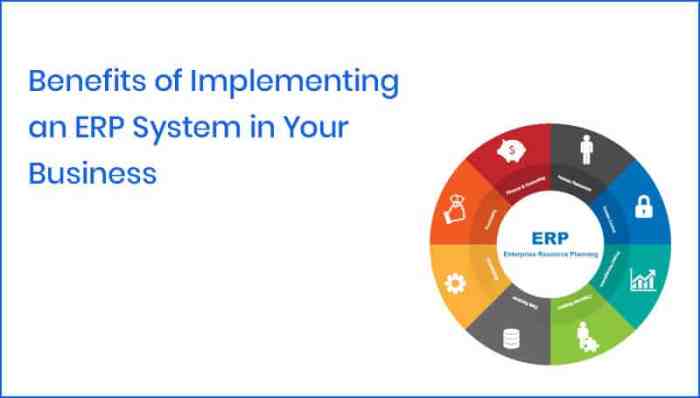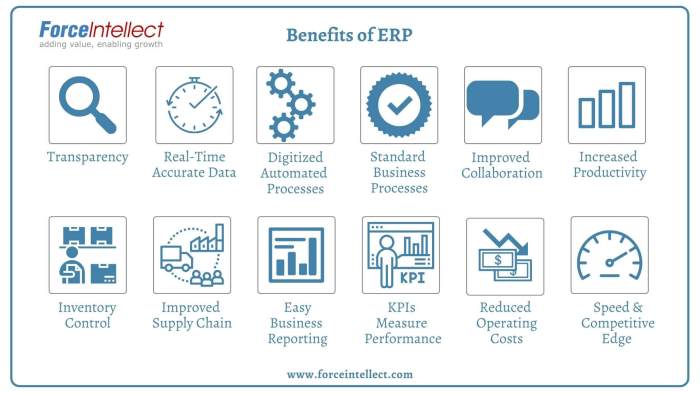Benefits of implementing an ERP system for service businesses sets the stage for this enthralling narrative, offering readers a glimpse into a story that is rich in detail and brimming with originality from the outset.
In today’s competitive service industry, businesses are constantly seeking ways to enhance efficiency, improve customer satisfaction, and drive growth. Enter the Enterprise Resource Planning (ERP) system, a powerful tool that can revolutionize operations and unlock new levels of success for service-oriented organizations. By integrating various business functions, from customer relationship management to financial accounting, an ERP system provides a comprehensive solution for streamlining processes, centralizing data, and gaining real-time insights.
This article explores the multifaceted benefits of implementing an ERP system for service businesses, highlighting its impact on operational efficiency, customer service, financial management, productivity, and data analysis.
Enhanced Financial Management

An ERP system can significantly improve the financial health of a service business by providing a centralized platform for managing financial data, automating processes, and generating real-time insights. This enables businesses to make informed decisions, streamline operations, and enhance profitability.
Financial Forecasting and Budgeting
An ERP system helps service businesses improve financial forecasting and budgeting by providing tools to analyze historical data, identify trends, and create accurate predictions.
- Historical Data Analysis: ERP systems collect and store historical financial data, including revenue, expenses, and cash flow. This data can be analyzed to identify patterns and trends, which can be used to forecast future performance.
- Scenario Planning: ERP systems allow businesses to create different scenarios for future performance based on various assumptions. For example, a business can create a scenario for increased demand or a scenario for a recession.
This helps them assess the potential impact of different events on their financial performance.
- Budgeting and Forecasting Tools: ERP systems provide tools for creating budgets and forecasts. These tools can be used to allocate resources, track spending, and monitor progress towards financial goals.
By leveraging these capabilities, service businesses can develop more accurate financial forecasts and budgets, enabling them to make better decisions about pricing, staffing, and investments.
Invoicing, Billing, and Payment Processing
An ERP system streamlines invoicing, billing, and payment processing by automating these tasks and reducing manual errors.
- Automated Invoice Generation: ERP systems can automatically generate invoices based on service contracts, time tracking records, and other relevant data. This eliminates the need for manual invoice creation, which saves time and reduces errors.
- Online Payment Processing: ERP systems can integrate with online payment gateways, allowing customers to pay invoices securely online. This eliminates the need for manual payment processing, which reduces administrative overhead and improves cash flow.
- Automated Payment Reminders: ERP systems can automatically send payment reminders to customers who are overdue on their invoices. This helps ensure that businesses receive timely payments and avoid late fees.
By automating these processes, ERP systems help service businesses improve efficiency, reduce costs, and enhance customer satisfaction.
Revenue and Expense Tracking, Benefits of implementing an ERP system for service businesses
An ERP system provides a comprehensive view of revenue and expenses, enabling businesses to track performance and identify areas for improvement.
- Real-Time Revenue Tracking: ERP systems can track revenue in real-time, providing businesses with up-to-date insights into their performance. This information can be used to identify trends, monitor progress, and make adjustments as needed.
- Detailed Expense Tracking: ERP systems can track expenses by category, project, and employee. This allows businesses to identify areas of overspending and make adjustments to improve efficiency.
- Reporting and Analysis: ERP systems provide a variety of reporting and analysis tools that can be used to track revenue and expenses, identify trends, and make informed decisions.
By providing a centralized platform for tracking revenue and expenses, ERP systems help service businesses gain a clear understanding of their financial performance and identify areas for improvement.
Increased Productivity and Collaboration: Benefits Of Implementing An ERP System For Service Businesses

An ERP system can significantly boost productivity and collaboration within a service business. By providing employees with real-time information and tools, streamlining workflows, and fostering communication across departments, an ERP system creates a more efficient and productive environment.
Real-time Information and Tools
An ERP system empowers employees with real-time access to critical information, enabling them to make informed decisions and perform their tasks more efficiently. For example, a service technician can access customer history, service records, and inventory levels through the ERP system, allowing them to quickly diagnose problems, order necessary parts, and complete repairs without delays. This real-time access to information eliminates the need for time-consuming searches, phone calls, or emails, ultimately saving time and improving efficiency.
Enhanced Collaboration
An ERP system facilitates collaboration between different departments within a service business, breaking down silos and fostering a more integrated approach to operations. For instance, the sales team can use the ERP system to track customer interactions, sales opportunities, and service requests, providing valuable insights to the service team. This shared information enables a seamless transition between departments, ensuring that customers receive consistent and efficient service throughout their journey.
Improved Resource Allocation and Scheduling
An ERP system provides tools for resource allocation and scheduling, optimizing the utilization of personnel and equipment. For example, service managers can use the ERP system to schedule appointments, assign technicians based on their skills and availability, and track the progress of service requests. This centralized system allows for better resource planning, reducing downtime and ensuring that customers receive timely service.
Additionally, the system can automatically generate reports and dashboards, providing managers with valuable insights into resource utilization and performance metrics.
Enhanced Data Analysis and Reporting

An ERP system revolutionizes data management for service businesses, enabling them to gain profound insights into their operations. This comprehensive approach goes beyond mere data collection; it empowers businesses to analyze, interpret, and leverage data to drive informed decision-making.
Types of Reports Generated by an ERP System
An ERP system offers a vast array of reports that provide valuable insights into various aspects of a service business. These reports can be customized to meet specific needs, offering a tailored view of key performance indicators (KPIs).
- Financial Reports: These reports provide a comprehensive overview of the financial health of the business, including revenue, expenses, profitability, and cash flow. Examples include balance sheets, income statements, and cash flow statements.
- Sales Reports: These reports offer detailed insights into sales performance, including sales by product, customer, region, and sales representative. They help identify top-performing products and customers, as well as areas for improvement.
- Customer Relationship Management (CRM) Reports: These reports provide valuable insights into customer interactions, including customer satisfaction, retention rates, and lead generation. They help businesses understand customer needs and preferences, enabling them to tailor their services accordingly.
- Project Management Reports: These reports track the progress of projects, including timelines, budgets, and resource allocation. They help identify potential delays or bottlenecks, enabling businesses to take corrective action.
- Inventory Management Reports: These reports track inventory levels, stock movements, and purchase orders. They help businesses optimize inventory levels, reduce waste, and ensure timely delivery of services.
- Human Resources (HR) Reports: These reports provide insights into employee performance, training needs, and workforce planning. They help businesses manage their workforce effectively and ensure they have the right skills and talent to meet their needs.
By embracing an ERP system, service businesses can unlock a wealth of opportunities for growth and success. From streamlining operations and improving customer service to enhancing financial management and gaining valuable insights, the benefits are undeniable. As the service landscape continues to evolve, businesses that leverage the power of ERP systems will be well-positioned to thrive and outpace their competition.
Quick FAQs
What is the average cost of implementing an ERP system?
The cost of implementing an ERP system can vary significantly depending on the size and complexity of the business, the chosen software solution, and the level of customization required. It’s essential to consult with ERP vendors to obtain a tailored cost estimate.
How long does it take to implement an ERP system?
The implementation timeline for an ERP system can range from several months to a year or more, depending on the scope of the project and the resources available. It’s important to establish a clear implementation plan and allocate sufficient time for training and testing.
What are some common challenges associated with ERP implementation?
Challenges during ERP implementation can include data migration, user adoption, system integration, and change management. It’s crucial to address these challenges proactively through careful planning, effective communication, and ongoing support.